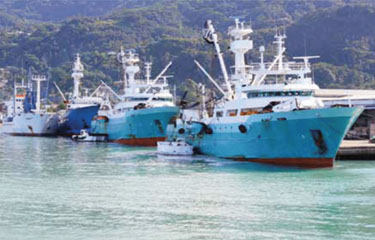The 26 members of Papua New Guinea’s Fishing Industry Association landed 123,266 metric tons (MT) of Marine Stewardship Council-certified yellowfin, skipjack, and bigeye tuna in 2021, according to its annual sustainability report, released in April 2022.
The report, delivered as part of the FIA’s Responsible Sourcing Policy, which was adopted in 2018, “show[s] our ongoing commitment to transparency within our tuna supply value chain strategy and the impact of [the policy] in the PNG tuna fishery,” FIA PNG Sustainability Director Marcelo Hidalgo said.
“Since 2020, our catches have maintained a composition of 90 percent unassociated sets (free school) and 10 percent associated FAD (fish-aggregating device sets). The National Fishery Authority has maintained continuous 100 percent observer onboard coverage that, together with the Industry Fisheries Information Management System (iFIMS), report almost in real-time tuna catches and their catch’s composition to the authorities,” Hidalgo said.
In 2021, the FIA applied for a geographical scope extension to allow its 48-vessel tuna fleet to fish in the Western Central Pacific Ocean, a fishing ground with an estimated 730,000 metric tons (MT) of tuna biomass. The FIA is now undergoing the first surveillance audit required by MSC, and must demonstrate progress in the conditions set by MSC via its fishery assessment issued when the fishery was certified in May 2020.
“We continue to do this to show our ongoing commitment to transparency within our tuna supply value chain strategy and the impact of our RSP in the PNG tuna fishery,” Hidalgo said.
Through the RSP, the FIA has collaborated and engaged with numerous international organizations and NGOs including International Seafood Sustainability Foundation (ISSF), Global Tuna Alliance, Ocean Outcomes, FAO, Geonardo, Auchan, FISHWISE, Human Rights at Sea, Conservation International, ANCORS, Global Dialogue on Seafood Traceability, Global Sustainable Seafood Initiative (GSSI), Conservation Alliance for Seafood Solutions (CASS), and Fishchoice, Hidalgo said.
FIA PNG President and Chairman Sylvester Pokajam said the MSC certification has been a boon for PNG’s tuna industry.
“The FIA MSC certification scheme has greatly added value to our domestic industry which our members have fully benefited from,” he said. “I will continue to lead the Association forward in meeting international standards through good governance, traceability, transparency, and accountability. Under my leadership, we will continue to undertake our primary functions to better represent and facilitate our members’ common vision, goals, and objectives. We continue to uphold best practices and ensure we deliver to our members on time, and with real-time information and support.”
U.K.-based retailer Tesco recently began purchasing Marine Stewardship Council-certified tuna from Papua New Guinea, and in the report, IFC Operational Manager Fernando Maliwanag, RD Group Chairman Roland Salangsang, and Majestic Seafood General Manager Napoleon Benitez all vouched for the MSC certification enhancing their company’s business prospects.
“PNG-FIA MSC certification showed to our customers, most especially in Europe, PNG’s commitment towards tuna resource sustainability,” Benitez said. “The certification provided opportunities for the company to link up with private-label brand owners and major grocers and create additional value to canned tuna product PNG exports. Its elementary and common business sense that Majestic and other tuna processors and PNG manage its tuna resources well now and in the future.”
Pokajam said the FIA is now pushing for MSC certification of its other fisheries, beginning with rock lobster. However, in March 2022, Pokajam detailed a problem with PNG’s current fisheries current policy document, which he said is charging higher prices for the country’s vessel-day scheme, which governs its tuna-fishing sector. Pokajam said other Pacific nations are charging USD 6,000 to USD 7,000 (EUR 5,470 to EUR 6,380) for daily access for their domestic fleets, but in PNG, the cost is USD 10,500 (EUR 9,600) daily. Those higher prices are passed through to processors, which have threatened to close due to high operational costs, he said.
Photo courtesy of PNG FIA







